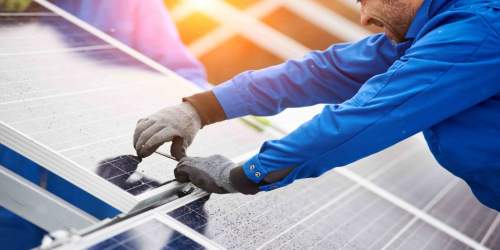Read Time : 3 Minutes
Solar Panels for Caravans
Solar energy is frequently praised for being an eco-friendly alternative to fossil fuels, and it is becoming increasingly popular with homeowners across the globe. Despite environmental-friendliness being their most famous benefit, solar panels also have another huge advantage; they increase the independence of your home from the National Grid. This is especially beneficial to two types of home – those in remote locations that have difficult access to electricity, and those that are constantly on the road. Owning a caravan or motorhome is often about being completely free, even from electrical cables. Solar panels grant you that independence while also reducing your carbon emissions. However, choosing the right system for you can be a little trickier. Take a look below for all the information you need. Alternatively, if you are looking for a guide to solar panels for camping, you can click here.
Choosing the right solar panels
The first thing you need to know before you make the decision to invest in solar panels, is the amount of electricity that you will need to power your caravan or motorhome. You can find this out easily by going camping with a fully charged battery without connecting it to electricity, and calculating how long the battery is able to supply power to your appliances for. When the battery runs out of power, you can then determine how much energy is used per day, and use that to help you choose the right solar panels for your needs. If you cannot calculate the usage, however, you can check the power ratings of each appliance to estimate the amount of electricity you would need. This can be found on their labels, and is often online too.
COMPARE PRICES FROM LOCAL INSTALLERS
Compare prices from local companies fast & free
Enter your postcode to compare quotes from leading professionals. We promise to keep your information Safe & Secure. Privacy Policy
Solar Panel Systems
Solar panels come with different power ratings, ranging between 1kW and 12kW for domestic use. Most of the solar powered homes in the UK use mid-range solar modules, such as the 4kW and 5kW models. The lower rated systems do not usually generate enough electricity to power home appliances, while those over 6kW are suitable for very large properties. Ratings show how much power the panels are able to produce under standard working conditions, but these numbers are primarily used to compare solar panels and do not indicate the exact power output of solar panels at all times. For example, 4kW panels will not generate that amount of power at any point in the day, but it does mean they will generate less power than 6kW panels. In fact, power output varies according to the hour of the day, and the season. The peak season tends to be summer, which is when the solar panels are exposed to the most sunlight for longer periods of time, and the sky is not usually obstructed by clouds.
Types of solar panels
There are two main types of solar panel – thin film and crystalline. Crystalline solar panels can either be monocrystalline or polycrystalline, depending on the purity of the silicon they are made from. They also have different appearances. Monocrystalline cells are black with rounded angles, and polycrystalline ones are blue and speckled with square corners. The other category is thin film or amorphous solar panels, which are made of a fine layer of silicon that has been sprayed onto another backing material. Due to the fact they use a lot less material than their crystalline competitors, thin film panels are cheaper, but they are also less durable and efficient, so they take up much more space. Monocrystalline and polycrystalline solar panels, on the other hand, are made in a similar way, and the differences between them are much less significant. Monocrystalline panels are slightly more efficient, and they cost more. Generally, it is a matter of quality. Polycrystalline panels that are made well will likely perform better than low-quality monocrystalline ones. However, these differences matter even less when it comes to caravans, since the panels are made to power a battery. If you are installing panels at home, then you might want to take these differences into account and check out this page. Finally, don’t forget that crystalline solar panels are even more susceptible to shading, so even the shadow of a wire can make a difference in the power output.
Solar panel tips
If you are considering investing in solar panels for your caravan or motorhome, there are some practicalities that you should make sure you are aware of: You will still need a leisure battery to power your appliances. The solar panels will feed energy to the battery, just like an electric point would. The primary difference is that you would be continuously producing energy without having to stop at specific locations in order to recharge the battery. Solar panels also allow you to be independent from the grid. Connecting them to the battery is usually as simple as attaching a few clips, unless the manufacturer of the caravan provides you with specialist adaptors. You should also consider whether you want fixed or mobile solar panels. When you go to make this choice, you should do so while keeping in mind that the panels must have the best possible exposure to the sun. They should be positioned so as to take advantage of the strongest sunlight, which comes at midday. Therefore, the panels have to be positioned so that they are facing south during other seasons. Angling the panels so that they face this direction will ensure maximum output during most seasons. You will need to use an inverter to turn the DC power that is generated by the solar panels into AC power, which is what your appliances use to power themselves. You will also need to make sure your battery is always in excellent condition, since you will be relying on it for the production of all the electricity you use. Solar panels have quite a long lifespan, but taking care of your battery is a top priority when it comes to caravans and motorhomes. Solar panels also work when the sky is cloudy, and they even work behind glass. However, you should keep them outside in order to benefit from the maximum capacity they have to offer. If they are shielded by glass or plastic, it could take them up to three times longer to power up your battery – even with a clear sky. This is because they are designed for direct exposure to sunlight.
Would you like to invest in solar panels?
If you are interested in investing in solar panels for your home or your caravan, you can fill in the no obligation form on this page. It only takes a minute, and it allows our team of professional installers to contact you regarding the best offers available to you in your area. It’s free, fast, and easy.
Find a local installer
Welcome to the biggest directory of UK renewable energy companies





 How Much do Solar Panel Systems Cost in 2024?
How Much do Solar Panel Systems Cost in 2024?







